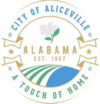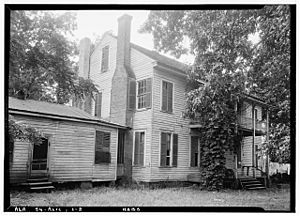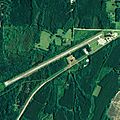Aliceville, Alabama facts for kids
Quick facts for kids
Aliceville, Alabama
|
|||
|---|---|---|---|
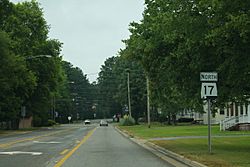
Street Scene in Aliceville
|
|||
|
|||
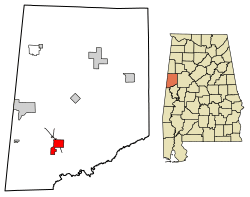
Location of Aliceville in Pickens County, Alabama.
|
|||
| Country | United States | ||
| State | Alabama | ||
| County | Pickens | ||
| Area | |||
| • Total | 4.57 sq mi (11.84 km2) | ||
| • Land | 4.57 sq mi (11.84 km2) | ||
| • Water | 0.00 sq mi (0.00 km2) | ||
| Elevation | 194 ft (59 m) | ||
| Population
(2020)
|
|||
| • Total | 2,177 | ||
| • Density | 476.37/sq mi (183.94/km2) | ||
| Time zone | UTC-6 (Central (CST)) | ||
| • Summer (DST) | UTC-5 (CDT) | ||
| ZIP code |
35442
|
||
| Area codes | 205, 659 | ||
| FIPS code | 01-01228 | ||
| GNIS feature ID | 0112988 | ||
Aliceville is a city in Pickens County, Alabama, United States. It is about 36 miles west of Tuscaloosa. In 2020, about 2,177 people lived there.
Aliceville was founded in the early 1900s and became an official city in 1907. It is well-known for its World War II prisoner-of-war camp, called Camp Aliceville. Since 1930, Aliceville has been the biggest city in Pickens County.
Contents
History of Aliceville
The area that became Aliceville started as a small settlement in 1902. This was when the first store opened there. The town was named after the wife of John T. Cochrane. He was important in building the Alabama, Tennessee and Northern Railroad. This railroad helped the town grow.
By 1905, Aliceville had grown a lot. It had many stores, a bank, and other businesses. In 1907, the people of Aliceville voted to make their town an official city. They chose a mayor and five aldermen (city leaders). By 1910, the city had sidewalks and paved streets. They also started planning for water and electricity.
What Was Camp Aliceville?
During World War II, a special camp was built in Aliceville. It was a Prisoner-of-war camp for up to 6,000 German soldiers. Most of these soldiers were from the Afrika Korps. The camp was open from June 1943 to September 1945. Prisoners arrived by train on the St. Louis – San Francisco Railway.
Today, only an old stone chimney remains from the camp. However, the Aliceville Museum and Cultural Arts Center has a collection about the German POWs. It includes maps, photos, camp newspapers, letters, and artwork.
Aliceville and the Civil Rights Movement
The Civil Rights Movement was a time when people worked to end unfair treatment based on race. In smaller towns like Aliceville, this work could be very challenging.
In 1965, a minister named James Corder started a civil rights group in Aliceville. He called it the "Rural Farm and Development Council." This group organized peaceful protests at Aliceville city hall. They wanted to end unfair rules in the town.
In September 1969, students protested at an all-black school in Aliceville. The governor sent National Guard troops to the city. Two schools were closed for a day but reopened with the National Guard watching.
Voting Rights in Aliceville
In 1982, a woman from Aliceville named Maggie Bozeman spoke to the U.S. Congress. She talked about voting in Aliceville and Pickens County. She said that in 1980, people voted openly instead of in private booths. White police officers were also in voting places. They took pictures of people who helped black voters. This showed that voting rights were still a problem.
Recent Events in Aliceville
In November 2013, a train carrying crude oil derailed near Aliceville. Three tanker cars exploded. About 750,000 gallons of oil spilled. Cleanup efforts lasted for many months.
Geography and Climate
Aliceville is located at 33°7′35″N 88°9′16″W / 33.12639°N 88.15444°W. The U.S. Census Bureau says the city covers about 4.5 square miles (11.8 square kilometers). All of this area is land.
What is Aliceville's Climate Like?
Aliceville has a humid subtropical climate. This means it has hot, humid summers. Winters are generally mild to cool.
| Climate data for Aliceville, Alabama | |||||||||||||
|---|---|---|---|---|---|---|---|---|---|---|---|---|---|
| Month | Jan | Feb | Mar | Apr | May | Jun | Jul | Aug | Sep | Oct | Nov | Dec | Year |
| Mean daily maximum °C (°F) | 12 (53) |
14 (58) |
19 (66) |
24 (75) |
28 (83) |
32 (89) |
33 (92) |
33 (91) |
31 (87) |
25 (77) |
19 (66) |
13 (56) |
23 (74) |
| Mean daily minimum °C (°F) | −1 (31) |
1 (33) |
5 (41) |
9 (49) |
14 (58) |
19 (66) |
21 (70) |
21 (69) |
17 (63) |
9 (49) |
4 (40) |
1 (33) |
10 (50) |
| Average precipitation mm (inches) | 140 (5.5) |
130 (5.3) |
150 (5.9) |
130 (5.2) |
97 (3.8) |
97 (3.8) |
120 (4.7) |
84 (3.3) |
86 (3.4) |
81 (3.2) |
110 (4.4) |
120 (4.8) |
1,350 (53.2) |
| Source: Weatherbase | |||||||||||||
Population of Aliceville
| Historical population | |||
|---|---|---|---|
| Census | Pop. | %± | |
| 1910 | 640 | — | |
| 1920 | 944 | 47.5% | |
| 1930 | 1,066 | 12.9% | |
| 1940 | 1,475 | 38.4% | |
| 1950 | 3,170 | 114.9% | |
| 1960 | 3,194 | 0.8% | |
| 1970 | 2,851 | −10.7% | |
| 1980 | 3,207 | 12.5% | |
| 1990 | 3,009 | −6.2% | |
| 2000 | 2,567 | −14.7% | |
| 2010 | 2,486 | −3.2% | |
| 2020 | 2,177 | −12.4% | |
| U.S. Decennial Census | |||
Aliceville first appeared in the U.S. Census in 1910. Since 1930, it has been the largest town in Pickens County.
Who Lives in Aliceville?
| Race | Num. | Perc. |
|---|---|---|
| White (non-Hispanic) | 425 | 19.52% |
| Black or African American (non-Hispanic) | 1,679 | 77.12% |
| Asian | 6 | 0.28% |
| Other/Mixed | 41 | 1.88% |
| Hispanic or Latino | 26 | 1.19% |
In 2020, there were 2,177 people living in Aliceville. There were 898 households and 625 families.
Economy of Aliceville
Aliceville is home to the Federal Correctional Institution, Aliceville. This is a medium-security prison for women. It was built between 2008 and 2011. It can hold about 1,500 people. There is also a smaller camp for minimum-security prisoners.
Arts and Culture in Aliceville
Aliceville has the Aliceville POW Museum. This museum keeps important items from the World War II prisoner-of-war camp. It has papers, letters, maps, and other materials. The museum opened in 1995. It also has an exhibit about the Aliceville Coca-Cola bottling plant.
Schools in Aliceville
- Aliceville High School
- Aliceville Middle School
- Aliceville Elementary School
Famous People from Aliceville
- Stephen Fleck, a medical officer at Camp Aliceville
- Butch Hobson, a major league third baseman and manager in baseball
- Amos Jones, an American football coach
- Walter Jones, a former football player for the Seattle Seahawks
- Simmie Knox, a portrait artist
- Henry Smith, a former NFL defensive tackle
Images for kids
See also
 In Spanish: Aliceville para niños
In Spanish: Aliceville para niños
 | Jackie Robinson |
 | Jack Johnson |
 | Althea Gibson |
 | Arthur Ashe |
 | Muhammad Ali |



